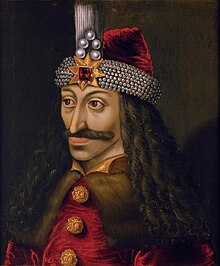Vladimir Dracula
| Vlad III Dracula | |
|---|---|
| Voivode of Wallachia | |

Ambras Castle portrait of Vlad III (c. 1560), reputedly a copy of an original made during his lifetime
|
|
| Voivode of Wallachia | |
| 1st reign | 1448 |
| Predecessor | Vladislav II |
| Successor | Vladislav II |
| 2nd reign | 1456–1462 |
| Predecessor | Vladislav II |
| Successor | Radu cel Frumos |
| 3rd reign | 1476 |
| Predecessor | Basarab Laiotă cel Bătrân |
| Successor | Basarab Laiotă cel Bătrân |
| Born | 1428–1431 |
| Died | December 1476 – January 1477 |
| Spouse | Unknown first wife Jusztina Szilágyi |
| Issue more... |
Mihnea |
| House |
Drăculești House of Basarab (original branch) |
| Father | Vlad II of Wallachia |
| Mother | Eupraxia of Moldavia (?) |
| Signature |  |
Vlad III, known as Vlad the Impaler (Romanian: Vlad Țepeș, pronunciation: [ˈvlad ˈt͡sepeʃ]) or Vlad Dracula (/ˈdrækjələ/; 1428/31 – 1476/77), was voivode (or prince) of Wallachia three times between 1448 and his death. He was the second son of Vlad Dracul, who became the ruler of Wallachia in 1436. Vlad and his younger brother, Radu, were held as hostages in the Ottoman Empire in 1442 to secure their father's loyalty. Vlad's father and eldest brother, Mircea, were murdered after John Hunyadi, regent-governor of Hungary, invaded Wallachia in 1447. Hunyadi installed Vlad's second cousin, Vladislav II, as the new voivode.
Hunyadi launched a military campaign against the Ottomans in the autumn of 1448, and Vladislav accompanied him. Vlad broke into Wallachia with Ottoman support in October, but Vladislav returned and Vlad sought refuge in the Ottoman Empire before the end of the year. Vlad went to Moldavia in 1449 or 1450, and later to Hungary. He invaded Wallachia with Hungarian support in 1456. Vladislav died fighting against him. Vlad began a purge among the Wallachian boyars to strengthen his position. He came into conflict with the Transylvanian Saxons, who supported his opponents, Dan and Basarab Laiotă (who were Vladislav's brothers), and Vlad's illegitimate half-brother, Vlad the Monk. Vlad plundered the Saxon villages, taking the captured people to Wallachia where he had them impaled (which inspired his cognomen). Peace was restored in 1460.
...
Wikipedia
